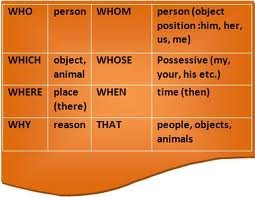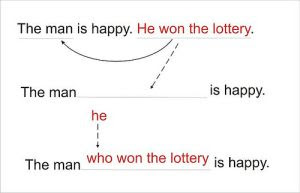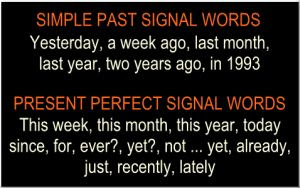 Sebelumnya, kita sudah belajar tentang adjective clause atau relative clause serta bagaimana menggabungkan kalimat dengan menggunakan adjective clause atau relative clause.
Sebelumnya, kita sudah belajar tentang adjective clause atau relative clause serta bagaimana menggabungkan kalimat dengan menggunakan adjective clause atau relative clause.Sekarang, kita akan mempelajari "peringkasan" adjective clause menjadi adjective phrase agar kalimat kita menjadi lebih efisien. Seperti halnya adjective clause, adjective phrase adalah salah satu testing point dalam tes TOEFL®, TOEIC®, dan Ujian Akhir Nasional (UAN) SMA dan SMK.
What is an adjective phrase?
Adjective phrase adalah "penyusutan" dari adjective clause. Fungsinya masih sama, yaitu menerangkan tentang seseorang atau sesuatu. Tidak seperti adjective clause, adjective phrase tidak memiliki subyek dan kata kerja. Pada kalimat-kalimat berikut, bagian kalimat yang bergaris bawah adalah adjective phrase.- In 1920, the Panama Canal was officially opened, finally linking the Atlantic and Pacific Oceans.
- Much of the prosperity of this region is due to a cigar factory established more than one hundred years ago.
- In 1799, a soldier discovered a piece of stele (a stone pillar bearing an inscription) known as the Rosetta stone.
- The giant redwood trees of California, called "sequoias", will further imprint Sequoia's name in history.
- After writing many letters seeking employment in local factories, she was finally hired by a big garment manufacturer.
Can we reduce all adjective clauses into adjective phrases?
Hanya adjective clause dengan subyek "who", "which", "that" yang bisa diringkas menjadi adjective phrase.How to reduce an adjective clause into an adjective phrase?
Ada dua cara meringkas adjective clause menjadi adjective phrase:- Subyek "who", "which", "that" dan verb be dihilangkan.
Reducing Adjective Clauses into Adjective Phrases Adjective Clauses Adjective Phrases The woman who is sitting next to our headmaster is the new supervisor. The woman sitting next to our headmaster is the new supervisor. The test which was given to us this morning was quite easy. The test given to us this morning was quite easy. She has just moved from Pasuruan, which is a town near Probolinggo. She has just moved from Pasuruan, a town near Probolinggo. The apples which are on that plate look fresh and appealing. The apples on that plate look fresh and appealing. - Jika tidak ada verb be, hilangkan "who", "which", atau "that", lalu ubah Verb menjadi bentuk -ing.
Reducing Adjective Clauses into Adjective Phrases Adjective Clauses Adjective Phrases The woman who sat next to our headmaster was the new supervisor. The woman sitting next to our headmaster was the new supervisor. The TOEIC® test, which consists of 200 test items, takes approximately two hours. The TOEIC® test, consisting of 200 test items, takes approximately two hours. A tapeworm is a parasite that lives in the intestines of humans and animals. A tapeworm is a parasite living in the intestines of humans and animals.
Now, practice what you've just learnt. Reduce the adjective clauses in the following sentences into adjective phrases.
- A thunderstorm is a form of weather which is characterized by the presence of lightning and its acoustic effect on the Earth's atmosphere which is known as thunder.
- The cloud type which is associated with the thunderstorm is the cumulonimbus.
- Thunderstorms most frequently form and develop within areas that are located at mid-latitude when warm moist air collides with cooler air.
- Thunderstorms, and the phenomena that occur along with them, pose great hazards to populations and landscapes.
- Damage that results from thunderstorms is mainly inflicted by downburst winds, large hailstones, and flash flooding which is caused by heavy precipitation.
- Mesoscale convective systems which are formed by favorable vertical wind shear within the tropics and subtropics are responsible for the development of hurricanes.
- Dry thunderstorms can cause the outbreak of wildfires with the heat that is generated from the cloud-to-ground lightning that accompanies them.
- The falling droplets create a downdraft of air that spreads out at the Earth's surface, which causes strong winds.
- Thunderstorms which cause hail to fall are known as hailstorms.
- Thunderstorms, which result from the rapid upward movement of warm and moist air, can be very disastrous.
- Azar B.S. Understanding and Using English Grammar (2nd Ed). NJ: Prentice-Hall. Inc, 1989, pg.257.
- Pyle M.A. and Munoz M.E. . TOEFL® Preparation Guide (5th Ed). Lincoln: Cliffs Notes Inc., 1995.
- http://en.wikipedia.org/wiki/Thunderstorm. Accessed Sept 25, 2011.







